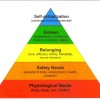
Photo by h.koppdelaney
Do you struggle with anxiety, fear, self-doubt, guilt or envy? I continue to – although nowadays perhaps with greater awareness. Anxiety about the impact children’s certain traits may have on their future, judging others and myself harshly, aversion to setbacks, fear of social disapproval, attachment to favourable outcomes, or even the unending doubts about my swing on the golf course!
Key human challenge
Any strongly felt negative emotions are our inner demons. We all have our fair share of them. They collectively operate like a convincing inner voice that significantly influences our every day thoughts and behavior. A majority of our inner demons are inborn. It’s kind of our karmic imprint. With childhood and other life experiences, they evolve. However, unless we consciously work towards resolving them, they continue to haunt us.
One of the key reasons we are unable to shake them off is that we are simply caught up in our outer and visible life. We pay disproportionate attention to our material growth and strongly identify with that progress. In the process, we loose sight of the inner journey – the need and the opportunity to reform our inner selves. Besides, we obsess about how we are perceived by others. We routinely judge others and in turn worry about being judged by our peers and social network.
While material progress is important, it’s not the core purpose of life. Alongside playing various visible roles at work, home and in our community, we have a deeper purpose to fulfil. It is to overcome our personal inner demons and to steadily replace them with courage, trust, love, compassion and mindfulness; and through that, discover our true potential for living a happy, balanced and meaningful life.
Impact on effectiveness
Our professional and personal effectiveness is directly and negatively impacted by the hold these inner demons have on our mental make-up. Elite sports psychologists repeatedly highlight that performance equals potential minus interference. True in life too. Our mental blocks, limiting beliefs and inner demons interfere with our potential shining through.
While they hold sway over our responses even in the most mundane moments, their impact gets accentuated in the key life-defining situations. Whether it’s a health scare, setback at work or a relationship challenge. Cricketers choke at vital stages of the game, leaders make strategic errors in economic downturns and parents fall prey to dysfunctional behavior under stress.
The four personal strategies I have found helpful
Non-judgmental awareness
Building deeper self-awareness about my thought-patterns, emotional responses and core beliefs have been crucial in the journey of positive change. However, what I have found central to engaging with my inner demons is cultivating non-judgmental self-awareness.
Ordinarily, if I became aware of a limiting trait, I readily focused on getting rid of it. I would hate being fearful and wished to be more courageous; felt troubled being anxious and craved for a calmer me. While it was a reflection of my improving self-awareness, it was never enough, as I continued to judge my traits.
Our judgmental self only feeds the inner demons. It strengthens self-doubt, insecurity and envy. When we let go of the judgment, we allow our inner wisdom to take over and make the healthy adjustments in our thoughts and behavior. If I merely observe how I am feeling in different situations, acknowledge the feeling without judging it, the feeling passes away sooner. Rather than wishing the fear or anxiety to go away, if only I can recognize it arising within me and watch it, without any judgment, it does lose its power. Likewise, when we realise a family member or a colleague acting out of insecurity, we merely attempt to raise their awareness about it rather than judge it.
If you are looking to engage with an inner demon, consider reflecting on how often do you feel that emotion, in what situations do you feel it more often, how do you tend to respond under the influence of this emotion and so forth. Building such awareness, without over-analysing or judging yourself for feeling this way, allows your body-mind to start taking corrective action towards its natural preference for better balance.
Letting go
Experiencing the space of non-judgmental awareness requires learning to let go; letting go of our attachment to our ego, identity and way of thinking. For example, many of my actions emanated from the subconscious desire for self-protection – attempting to protect my ego and my favourable sensory experiences. I would avoid taking a tough stand in some discussions, lest I should not be liked. I resisted the unpleasant and craved only the pleasant.
I have found meditation to be very helpful in learning to let go. I used to practice Vipassana and have lately been trying Transcendental Meditation. Firstly, the very discipline of daily meditation forces me to let go of my attachment to other pursuits, at least for those few minutes, and reinforces the importance of connecting within. Further, experiencing even fleeting moments of stillness shines light on the futility of our everyday recurring thoughts, many of which are an output of our inner demons.
Self-referral
We are social animals and are easily impacted by how we are perceived in our social circle. Any risk to our perceived standing in our network can be emotionally paralysing. A lot of our fears, insecurity, doubt and anger emanates from this. Our inner demons exaggerate the negative impact.
On the other hand, if we choose to connect with our core personal values, identify a clear life purpose, and commit to living by those personal anchors, we can protect ourselves from this negativity.
Self-acceptance
One of the outcomes of slowing down and deepening our self-awareness is that everything appears a little more clearly. It’s the difference between seeing your reflection in moving and still water. As I closely observe my own thoughts, emotions and actions, I notice my inner demons more distinctly. In fact, sometimes they appear amplified. This can be overwhelming. It’s easy then to not only be anxious, but also become anxious about being anxious.
Accepting ourselves the way we are, with all our limitations included, is important to deal with this emotional overload. Being kind to our anxious, greedy or paranoid self, and accepting it without judging it, is key to this. Such self-acceptance doesn’t mean we stop caring about self-improvement; it’s just that we pursue personal growth from a place of acceptance and not inadequacy.
Endnote
I have come to realise that this journey is challenging and requires conscious effort and sustained commitment. While it is democratically available to anyone who’s keen, irrespective of their background, age and financial status, we just get consumed by the humdrum of life and ignore it. All the same, pursuing it has its rewards. Non-judgmental awareness and letting go of our egoistic drive can help us to slowly neutralise the baggage of our past karma. It can also help us experience greater strength, peace, love and happiness.
Look forward to your comments and sharing!











 This New Year: Whatever Your Goals, Try Practicing This
This New Year: Whatever Your Goals, Try Practicing This Yeh Dil Maange More! (…Or This Heart Craves for More)
Yeh Dil Maange More! (…Or This Heart Craves for More) Artha, Kama, Dharma, Moksha and The Sweet Spot of Life
Artha, Kama, Dharma, Moksha and The Sweet Spot of Life Taming Our Monkey Mind
Taming Our Monkey Mind Maslow’s Hierarchy Revisited…the Eastern Way!
Maslow’s Hierarchy Revisited…the Eastern Way!
Digital Detox – staying off electronics the first one hour and last one hour of the day, is one more prescription for today’s position. The trick really is in identifying the negative thought quickly – all methods suggested by Rajiv, help here. Once noticed, arresting the same and coming back to what you were doing originally is the transition time that needs to be hastened. Finally, I have noticed that having your meals on time helps – anger and stray thoughts gallop on empty stomachs !
Wish each of you great success in conquering your Inner Demons.
Hi Rajiv, well-written article especially the strategies for handling our inner demons. Just wondering if this is similar to the “Shadow” concept which Carl Jung talks about?
Thanks, Srini
PS: I am currently reading your book ‘Discovering Your Sweet Spot’ and it has helped me to discover my purpose in life and I have also developed my life purpose statement.
Hi Srini, thank you for your sharing. Glad you are enjoying the book!
Yes, the idea of demons is close to the notion of ‘shadow’ that Carl Jung talks about except that he generally referred to it in the context of the existence of even stronger, even if usually not fully active, negative forces within each of us which if not addressed, or fuelled by events surrounding us, could lead us to be almost evil-like.
I have referred to the demons in the post as everyday, but strong, negative emotions that exist within each of us that can be managed, perhaps not eliminated, with conscious effort and non-judgmental awareness.
Regards, Rajiv
Rajiv, thanks for sharing another well written article.
As you say, its so much about the self – Self awareness, self referral, self acceptance – connecting with the self.
best, shrikant
Very nice article. Worth reading. Thanks for sharing your views Rajiv.
Wonderful article Rajiv. Only when each of us learns to deal with our own inner demons then we will stop being outer demons for others in our life.
I liked this article. It guides us in dealing with our internal demons. Thank you so much for sharing it with us. Valuable advice